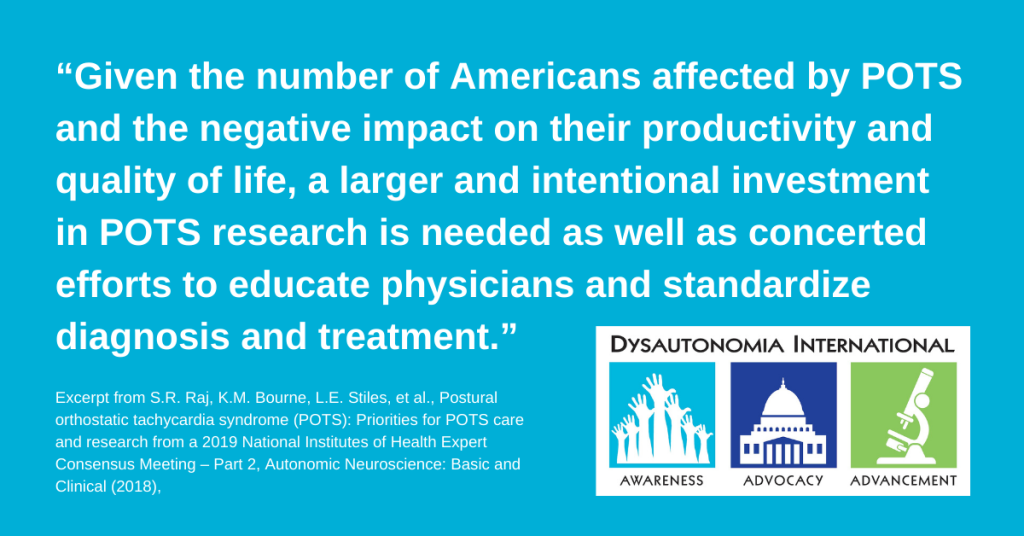Hot of the presses! We are excited to announce that two journal articles summarizing the findings of the first National Institutes of Health (NIH) Postural Orthostatic Tachycardia Syndrome (POTS) Research Workshop, written by 30 of the top POTS experts including Dysautonomia International representatives, are now available. Part 1 summarizes the current state of scientific knowledge and POTS clinical care. Part 2 summarizes the top priorities for POTS clinical care and research, and calls for the NIH to fund an additional $50 million in POTS research over the next five years. (links below)

Persuading the NIH to host this workshop was the result of several years of Congressional advocacy by dedicated Dysautonomia International patient, caregiver and physician volunteers. As a result of our advocacy efforts, Congress encouraged NIH to host a POTS research workshop and directed the NIH to report back to Congress on:
(1) the current state of POTS research;
(2) priority areas of focus for future POTS research through 2025;
(3) ongoing and upcoming efforts by NIH to advance the scientific understanding of POTS; and
(4) an estimate of the level of funding that would be needed to achieve the above stated objectives.
The workshop took place on June 29, 2019 at NIH headquarters in Bethesda, Maryland the morning after Dysautonomia International’s 2019 Conference in Philadelphia, which most of the POTS experts had participated in. After presentations from several speakers, including Dysautonomia International President Lauren Stiles, and Dysautonomia International Medical Advisory Board members Dr. Satish Raj and Dr. Steven Vernino, who co-chaired the NIH meeting, and other experts, the attendees created recommendations for the NIH on what POTS research priorities NIH should support in the next five years.
The NIH staff summarized the impressive list of attendees and NIH’s perspectives on the workshop on the NIH website, and in a report to Congress from NIH Director Dr. Francis Collins. The POTS experts wrote their own summary, in the form of two journal articles, to further elaborate on their findings from the workshop and make recommendations to Congress and the NIH:
Part 1 – Postural orthostatic tachycardia syndrome (POTS): State of the science and clinical care from a 2019 National Institutes of Health Expert Consensus Meeting (this article summarizes the current state of scientific knowledge on POTS and the state of clinical care)
Part 2 – Postural orthostatic tachycardia syndrome (POTS): Priorities for POTS care and research from a 2019 National Institutes of Health Expert Consensus Meeting (this article summarizes gaps in scientific knowledge and clinical care, and identifies the top POTS research priorities for the next five years).
“While everything we know about POTS and everything we need to do for POTS patients cannot fit into two journal articles, these articles reflect an incredible collection of knowledge about POTS, and lay out the blueprint for the hard work that we must do to advance POTS research and clinical care.” noted Lauren Stiles, Dysautonomia International President and co-founder.
Dr. Satish R Raj Professor of Cardiac Sciences at the Libin Cardiovascular Institute and the Cumming School of Medicine at the University of Calgary, and co-chair of the NIH meeting explained, “[t]his is an important milestone for POTS research. We hope that the resulting recommendations that resulted from this workshop will be implemented by the NIH and other research funding agencies around the world.”
___________________
Dysautonomia International is proud to be the voice of our patient community in the halls of government. Our strategic advocacy efforts are designed to affect change that will create a better future for people living with POTS and other forms of dysautonomia. We are able to do this advocacy work because of the support of individuals like you. Please consider making a contribution at DysautonomiaInternational.org/donate today to support our ongoing advocacy, research, and education efforts. We are making progress, but with your support, we can do even more!